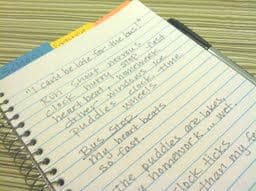A journal is a place to express yourself, to record your thoughts, feelings and observations, and to cultivate your poetic style. The cool thing about your journal is that it’s yours. You can keep it secret or share it with your friends and family. You might even read some of your poetry out loud at a talent show or poetry jam. Whatever you decide to do with it, a daily poetry journal will keep you writing. And the more you write, the better writer you become!
Step One: Choose a journal that fits your style
Do you like to draw pictures and doodle around your poetry? If so, you might want a book with blank pages. Do you need help keeping your words in order? Then try a journal with lines, such as a spiral-bound notebook. If you write all day long whenever inspiration strikes, use a smaller book with a hard cover that you can tuck into your backpack, purse, or pocket.
Step Two: Organize your journal
While this is an important step, it will be different for everyone. You can divide your journal in several different ways:
- Emotions: Joy, Anger, Sorrow, Humility, Pride
- Seasons: Winter, Spring, Summer, Fall (add the different holidays within each season.)
- Chronological: Just write the date at the top of the page.
- Poetic Form: Acrostic, Cinquain, Clerihew, Diamante, Haiku, Limerick, Free Verse, etc.
- Subject: Sports, Humor, Dance, Friends, Nature, School
Once you’ve decided how to organize your journal, use a paper clip, divider, sticky note, or colored tape to divide your sections. (You do not need to do this for a chronological journal.)
Step Three: Write!

Jot down interesting words, phrases, sentences, or feelings on the page before starting your poem. This provides a jumping-off point for your thoughts.
For example, today I heard someone say, “I can’t be late for the bus!” So, I wrote that sentence on the top of a page in my “School” section.
Next, write down words that have to do with your phrase. For mine, I chose: Run, shout, nervous, hurry, stop, fast, heartbeat, homework, driver, windows, ice, puddles, clock, time, and wheels.
Then, decide what type of poem you want to write. For this one, I selected free verse.
Finally, use some of the words on your page to write your poem.
Bus Stop
My heart beats
so fast.The puddles are lakes,
my homework… wet.The clock ticks
faster than my feet
can run.I shout to the driver,
“Stop!”Wheels slow.
Take a breath.I can’t be late for the bus.
Step Four: Keep it up!
It’s important to write in your journal on a regular basis. Finding a routine can help with that. Maybe you have quiet time at night before bed, when you’re riding on the bus, or at lunch break. Make it a part of your day, and soon you’ll have an entire journal full of incredible poetry!






